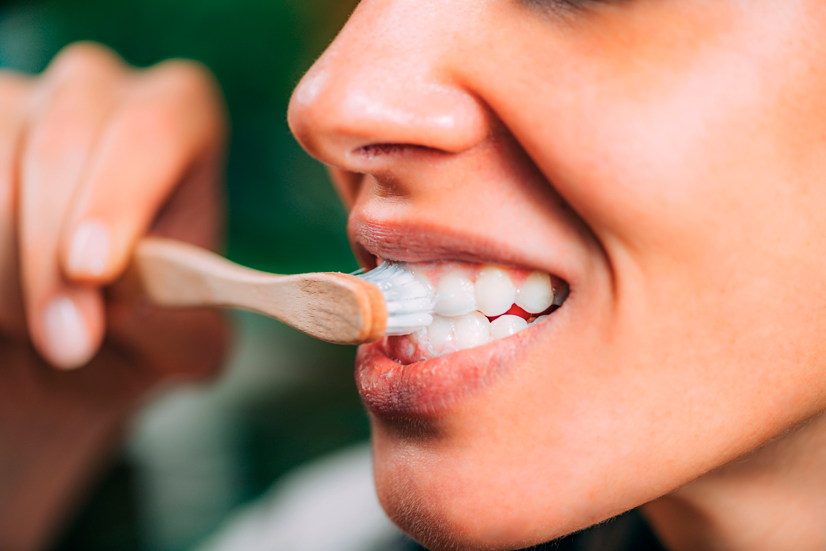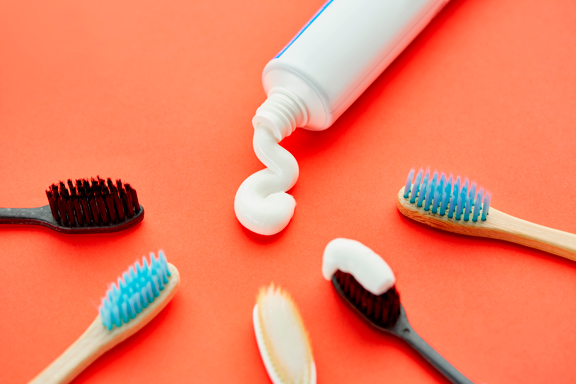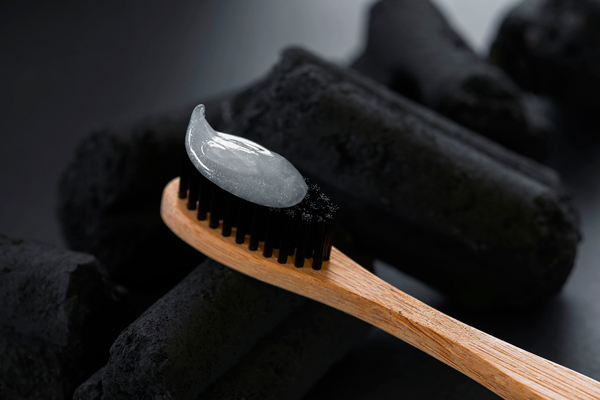If you’re like most people, you probably think that all toothpastes are basically the same. You would be surprised to learn how many different types of toothpaste there are on the market today! In this guide, we will discuss Non-Abrasive Toothpaste in detail. We’ll answer some common questions, and review some of the best products on the market. We’ll also provide some useful tips for using effectively. So if you’re interested in learning more about this topic, keep reading!
Toothpaste abrasion is a measure of a toothpaste’s ability to damage tooth enamel and dentin through mechanical action (abrasion). The abrasion process primarily affects the neck of the tooth, and most commonly occurs on premolars and canines.
TOP 4 Non-Abrasive Toothpaste
Arm & Hammer Sensitive Toothpaste 83.33 RDA
pros:
-It’s affordable
-The ingredients are safe and effective
-It’s gentle on the teeth and gums
-It has a refreshing minty flavor
cons:
-It contains fluoride
-Some people may find the taste to be too minty
Sensodyne Pronamel Gentle Routine Toothpaste 94.12 RDA
pros:
-Gentle enough for everyday use
-Helps to protect against acidic erosion
-Freshens breath
-Contains fluoride to help prevent cavities
cons:
-More expensive than some other brands
-May not be as effective at whitening teeth
Tom’s of Maine Fluoride-Free Antiplaque & Whitening Toothpaste 71.43 RDA
pros:
-Fluoride free
-Gentle on the teeth and gums
-Helps to remove plaque
-Whitens teeth
-Some users find the taste unpleasant
cons:
-More expensive than some other brands
-May not be as effective at preventing cavities
Biotene H-24 Natural Whitening Toothpaste 89.29 RDA
pros:
-Contains enzymes that help to remove plaque
-Gentle on the teeth and gums
-Helps to whiten teeth
-Freshens breath
-Some users find the taste unpleasant
cons:
-More expensive than some other brands
-The enzymes may be too harsh for some users
Now that we’ve reviewed some of the best non-abrasive toothpastes on the market, let’s talk about how to use them effectively.
How Abrasion Both Cleans And Damages Your Teeth At The Same Time

We all know that brushing our teeth is important for keeping them clean and healthy. But did you know that the type of toothpaste you use can actually make a big difference in how effective your brushing is? Abrasive toothpastes are those that contain particles that help to remove plaque and other debris from your teeth. Non-abrasive toothpastes, on the other hand, do not contain these particles.
So what’s the difference between abrasive and non-abrasive toothpaste? Well, abrasive toothpastes can be more effective at removing plaque and other debris from your teeth. However, they can also damage your teeth if you use them too often. Non-abrasive toothpastes, on the other hand, are less likely to damage your teeth but may not be as effective at removing plaque and other debris.
So which type of toothpaste should you use? That depends on your individual needs and preferences. If you have sensitive teeth, for example, you may want to use a non-abrasive toothpaste. If you are looking for a toothpaste that is more effective at removing plaque and other debris, however, an abrasive toothpaste may be a better choice.
The 5 Things That Affect Enamel Health
There are a few key things that affect the health of your teeth and gums. Here are five of the most important:
-Brushing too hard: This can damage your enamel and cause your gums to recede. Use a soft-bristled toothbrush and gentle circular motions when brushing.
-Using a toothpaste with too much fluoride: This can cause white spots on your teeth. Use a toothpaste that contains the right amount of fluoride for your age and stage of life.
-Eating acidic foods and drinks: This can wear down your enamel over time. Eat or drink acidic foods and drinks in moderation, and brush your teeth soon afterwards.
-Grinding your teeth: This can damage your enamel and cause tooth sensitivity. If you grind your teeth, talk to your dentist about getting a mouth guard.
-Smoking: This can discolor your teeth and increase your risk of gum disease. If you smoke, talk to your dentist about ways to quit
Why Non-Abrasive Toothpastes Don’t Exist

The reality is that non-abrasive toothpastes don’t exist. Every toothpaste on the market today contains some form of abrasive ingredient. Even “natural” toothpastes that claim to be gentle on your teeth usually contain abrasives such as baking soda or salt.
So if every toothpaste on the market contains abrasives, then how do they differ? Non Abrasive Toothpaste is simply a marketing term that refers to toothpastes that contain relatively low levels of abrasives. These toothpastes are designed to be gentle on your teeth and gums, and are ideal for people with sensitive teeth.
If you’re looking for a Low Abrasive Toothpaste, be sure to read the labels carefully. Some toothpastes that claim to be Non-Abrasive may actually contain high levels of abrasives. And remember, even the gentlest toothpaste can damage your teeth if you use it too often. Use Non-Abrasive Toothpaste sparingly, and follow the directions on the package.
Radioactive Dentin Abrasion Index
The Radioactive Dentin Abrasion Index (RDA) is a measure of the abrasiveness of a toothpaste. It is expressed as a number, with the higher numbers indicating more abrasive toothpastes. The RDA measures the amount of wear on dentin that occurs when brushing with an abrasive toothpaste.
Toothpastes with an RDA of 100 or less are considered to be non-abrasive. Toothpastes with an RDA of 100 to 200 are considered to be mildly abrasive, while toothpastes with an RDA of 200 or more are considered to be moderately abrasive.
If you have sensitive teeth, you should use a toothpaste with an RDA of 100 or less. If you are looking for a toothpaste that is more effective at removing plaque and other debris, however, you may want to use a toothpaste with an RDA of 200 or more.
Keep in mind that the RDA is only one measure of a toothpaste’s abrasiveness. Other factors, such as the type of abrasive particles used, can also affect the amount of wear on your teeth.
To find out more about the RDA, talk to your dentist or dental hygienist. They can help you choose a toothpaste that is right for you.
Least Abrasive Toothpaste.
Tom’s of Maine Fluoride-Free Antiplaque & Whitening Toothpaste 71.43 RDA
Tom’s of Maine Fluoride-Free Antiplaque & Whitening Toothpaste is a gentle toothpaste that helps remove plaque and stains while leaving your teeth looking their best. This toothpaste is fluoride-free, sulfate-free, gluten-free, paraben-free, and does not contain artificial colors, flavors, or fragrances. Additionally, it is safe for use by people with sensitive teeth and gums.
Ingredients: water, hydrated silica, glycerin, Sorbitol, xylitol, calcium carbonate, lauryl glucoside, natural flavor (strawberry), zinc citrate, Stevia rebaudiana leaf/stem extract, mentha viridis (spearmint) leaf oil, echinacea angustifolia root extract, commiphora myrrha resin extract.
Directions: Adults and children two years of age and older brush teeth thoroughly after meals or at least twice a day or as directed by a dentist or physician
Sensodyne Pronamel Gentle Routine Toothpaste, for Sensitive Teeth 75.54
Sensodyne Pronamel Gentle Routine Toothpaste is a toothpaste that is designed for people with sensitive teeth. It is gentle on your teeth and gums, and helps to remove plaque and stains. Additionally, it contains fluoride to help protect your teeth from cavities.
Ingredients: water, hydrated silica, glycerin, sorbitol, PVM/MA copolymer, pentasodium triphosphate, flavor, xylitol, cocamidopropyl betaine, zinc citrate, Titanium dioxide.
Crest Gentle Routine Toothpaste 77.00 RDA
Crest Gentle Routine Toothpaste is a toothpaste that is designed for people with sensitive teeth. It is gentle on your teeth and gums, and helps to remove plaque and stains. Additionally, it contains fluoride to help protect your teeth from cavities.
Ingredients: water, sorbitol, hydrated silica, disodium pyrophosphate, trisodium phosphate, glycerin, flavor, xanthan gum, cocamidopropyl betaine, sodium lauryl sulfate, zinc citrate, methylparaben, propylparaben.
Aquafresh Sensitive Maximum Strength Toothpaste 78.57 RDA
Aquafresh Sensitive Maximum Strength Toothpaste is a toothpaste that is designed for people with sensitive teeth. It is gentle on your teeth and gums, and helps to remove plaque and stains. Additionally, it contains fluoride to help protect your teeth from cavities.
Ingredients: water, sorbitol, hydrated silica, glycerin, peg-12, sodium lauryl sulfate, flavor, xanthan gum, cocamidopropyl betaine, zinc citrate, Sodium Fluoride.
Arm & Hammer Complete Care Toothpaste, for Sensitive Teeth and Cavities 79.54 RDA
Arm & Hammer Complete Care Toothpaste is a toothpaste that is designed for people with sensitive teeth. It is gentle on your teeth and gums, and helps to remove plaque and stains. Additionally, it contains fluoride to help protect your teeth from cavities.
Ingredients: water, sorbitol, hydrated silica, disodium pyrophosphate, trisodium phosphate, sodium lauryl sulfate, flavor, xanthan gum, cocamidopropyl betaine, zinc citrate.
Popular Low Abrasive Toothpaste Brands
Some of the most popular brands:
Arm & Hammer Sensitive Toothpaste 83.33 RDA
Crest Gentle Routine Toothpaste 94.29 RDA
Oral-B Sensitive Gum Care Toothpaste 100.00 RDA
Sensodyne Pronamel Gentle Whitening Toothpaste 109.52 RDA
FAQ:

What toothpaste is not abrasive?
Toothpaste that is labeled non-abrasive or gentle is less likely to damage tooth enamel. Look for fluoride toothpaste with the American Dental Association’s (ADA) Seal of Acceptance, which indicates the product has been evaluated for safety and effectiveness.
What are the benefits of using non-abrasive toothpaste?
There are many benefits of using, including:
– Reduced risk of tooth enamel damage
– Less sensitivity to hot and cold temperatures
– Better protection against cavities and gum disease
– brighter smile.
What are the best non-abrasive toothpastes?
Some of the best on the market include:
– Crest Gentle Routine Fluoride Toothpaste
– Colgate Sensitive Pro-Relief Toothpaste
– Arm & Hammer Dental Care Sensitive Toothpaste
– Tom’s of Maine Rapid Relief Sensitive Toothpaste.
These toothpastes are all gentle on the teeth and gums and will not cause excessive wear to tooth enamel.
When should I use non-abrasive toothpaste?
If you have sensitive teeth or are at risk for tooth enamel damage, you should consider using non-abrasive toothpaste. Be sure to talk to your dentist about the best toothpaste for your individual needs.
What are the side effects of using non-abrasive toothpaste?
There are no known side effects. However, if you have sensitive teeth, you may experience temporary discomfort when switching to a non-abrasive toothpaste. If this occurs, talk to your dentist about other options.
How do you know if your toothpaste is non abrasive?
Most toothpastes will be labeled as such on the packaging. You can also check the ingredients list for abrasive agents such as silica or hydrated silica. If you’re unsure, ask your dentist for recommendations.
Is Colgate total an abrasive toothpaste?
No, Colgate Total is not an abrasive toothpaste. It is safe for use on all types of teeth, including sensitive teeth. However, some people may experience temporary discomfort when switching to Colgate Total from another toothpaste. If this occurs, talk to your dentist about other options.
Is baking soda toothpaste non abrasive?
Yes, baking soda toothpaste is non-abrasive and will not damage tooth enamel. Baking soda is also effective at removing stains from teeth, making it a good choice for those who want to brighten their smile.
These toothpastes are all designed to be gentle on your teeth and gums, and they contain relatively low levels of abrasives. Remember, even the gentlest toothpaste can damage your teeth if you use it too often. Use Non-Abrasive Toothpaste sparingly, and follow the directions on the package.
We hope this guide has been helpful in choosing the best non-abrasive toothpaste for you! Be sure to consult with your dentist if you have any questions or concerns. Thank you for reading!
